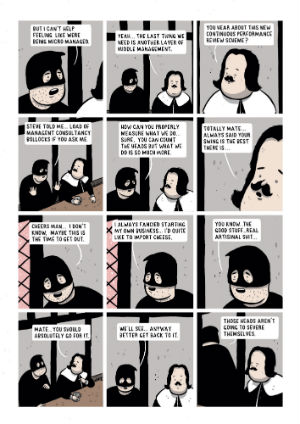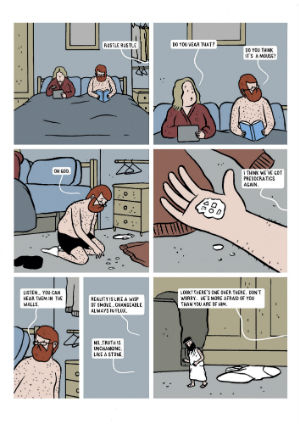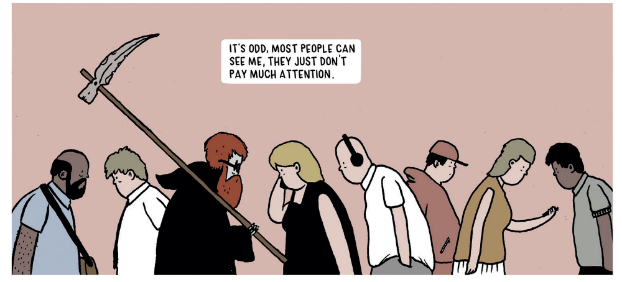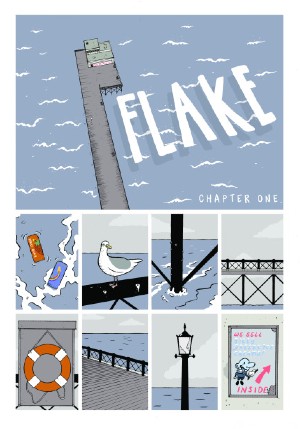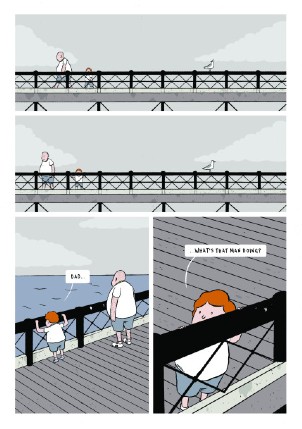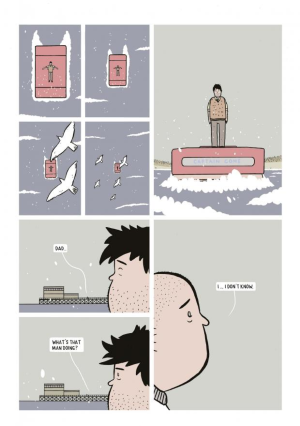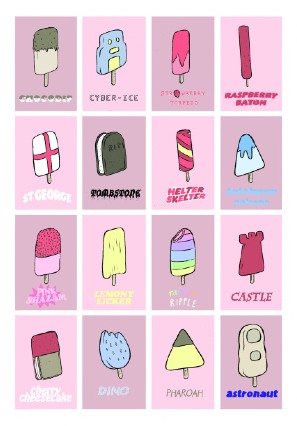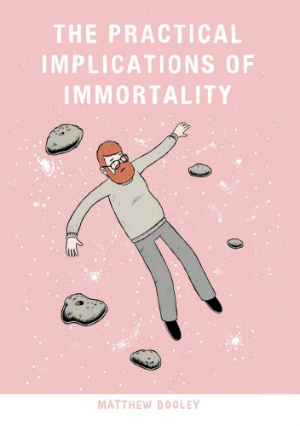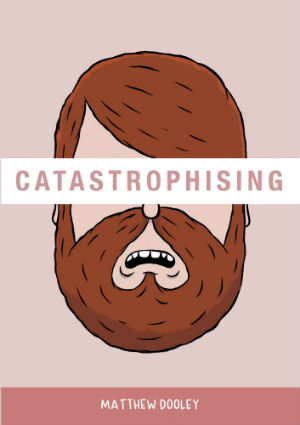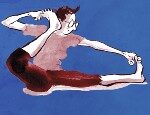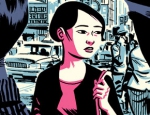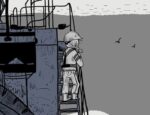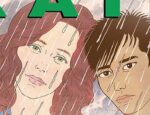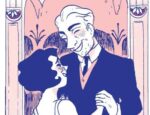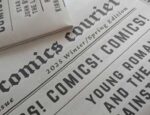Matthew Dooley has an off-centre, idiosyncratic, and often bleakly humorous view of the world; something that has been a constant on the UK indie scene since his work first started appearing in such influential anthologies as Dirty Rotten Comics and Off Life. His short strips have been seen in collections like Meanderings. The Practical Implications of Immortality and Catastrophising, and in 2016 he won the 2016 Cape/Observer/Comica Short Story Prize for ‘Colin Turnbull: A Tall Story’.
Last year his debut graphic novel Flake, a tale of warring ice cream men, was published by Jonathan Cape and went on to be Eisner Award-nominated this year. I caught up with Matthew to talk about small press community, shared universes, and launching Flake in a pandemic year…
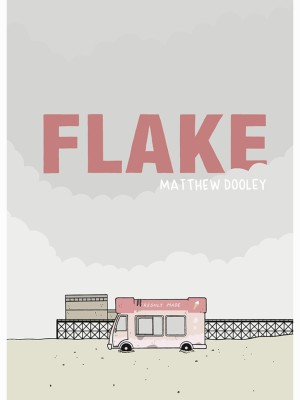 ANDY OLIVER: So let’s start with a congratulations for your much deserved Eisner Awards nomination. As someone who is no stranger to awards/competition recognition how did this latest accolade feel?
ANDY OLIVER: So let’s start with a congratulations for your much deserved Eisner Awards nomination. As someone who is no stranger to awards/competition recognition how did this latest accolade feel?
MATTHEW DOOLEY: This came as a huge surprise… particularly as I found out via a WhatsApp group I’m in with some other comic creators! Obviously when making Flake I didn’t set out with the intention of being nominated for any awards but it is enormously gratifying to have your work recognised in that way.
AO: You’ve been one of those UK indie scene mainstays over the last several years with a regular presence in anthologies, micropublished comics and self-published offerings. Can you tell us about your artistic background and what your entry point into comics was?
DOOLEY: I read comics as a kid – stuff like Asterix, 2000 AD, Tintin, Sonic the Comic – as well as drawing constantly. I moved onto to a bit of manga in my mid-teens, there was a monthly anthology called Pulp that particularly blew me away, but I’d drifted away from reading comics by the time I reached University. It was only in my mid-twenties did I start reading them again. I can’t remember precisely why I bought McSweeney’s 13 but it proved to be a very significant purchase. For those not familiar with McSweeney’s, it is a publisher who produces, amongst other things, a literary quarterly. Number 13 was all about comics and I was hooked.
The artist featured who I was most drawn to was Jeffrey Brown. Perhaps it was that his aesthetic sat so comfortably with the music I listening to at the time, it felt lo-fi and homemade. Whilst I think Jeffrey Brown’s drawing is actually deceptively great it seemed achievable. Having made tentative efforts at gag cartooning with little success I decided to turn to comics. But it was some time before I really got started. I thought about doing comics rather than ever putting pencil to paper. I saw the Cape/Observer/Comica prize and thought I should enter that. When I eventually did in 2012, my entry was the first pages of comics I had done since I was a kid.
AO: I first discovered your work in anthologies like Off Life and the much missed Dirty Rotten Comics. How vital were group efforts like that in not just raising your profile and building an audience but in forging links with the wider comics community?
DOOLEY: Alongside the Cape competition, anthologies were the other thing to get me going. I need a deadline otherwise I won’t do anything, so having a date by which to submit something is a useful motivator. I’d been scratching around doing bits and pieces, not really getting anywhere, wondering if there was much point to bothering with comics. I then saw that Dirty Rotten Comics were taking submissions for a new book and took a punt sending them a silly comic about someone with a balloon for a head. They took it and that was the first of a number of comics they published in subsequent DRCs.
Seeing your work in print for the first time is a massive thrill and DRC were amazing at finding new people on the small press scene and giving them that opportunity. Perhaps more importantly, I became good mates with Gary and Kirk, the guys who edited DRC. Comics is a solitary pursuit for the most part but the small press community is a very friendly and supportive one. I don’t think I’d have persisted with making comics if had been just me sending them out into the void. Feeling part of the community is a big reason I make comics.
AO: Throwaway Press published your original solo collections of work in Meanderings and The Practical Implications of Immortality, and you’ve also self-published Catastrophising. The absurdist slice-of-life humour of those collections where the incongruous is embedded into the everyday gives them a very distinctive flavour. What most appeals to you about that kind of fantasy autobio approach? And is there something almost cathartic about the self-deprecating way you present yourself in your strips?
DOOLEY: I am an egomaniac so I like drawing myself over and over again. But… my life is not interesting. Much better to draw myself in ridiculous and fantastical situations as a way to explore ideas that interest me. My shorter comics are mostly ‘what if…’ – what if you actually lived forever or you were temping as the Grim Reaper and so on. From that starting point I might ask what are the mundane practicalities that arise from these scenarios. For instance, if I was a ghost what would it be like to try and find somewhere to haunt in an overcrowded London property market. As far as the self-deprecation goes… that is a reasonable reflection of my actual, real life fecklessness.
AO: You have a very clear and accessible cartooning style. What mediums do you work in to bring your wonderfully bizarre flights of fancy to the page?
DOOLEY: It is very straightforward. I pencil and ink on paper, then scan and add colour, word balloons and letters on Photoshop.
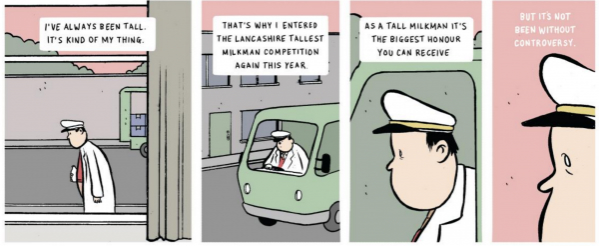
AO: How much of a game-changer for you was winning the 2016 Cape/Observer/Comica Short Story Prize for ‘Colin Turnbull: A Tall Story’ (above)?
DOOLEY: It is, without doubt, the most important moment in my time making comics. It felt like a great affirmation that I was on the right track and that comics were worth pursuing more seriously. It also gave me a window of opportunity to try and get working on something more substantial. A number of the previous winners, Isabel Greenberg and Stephen Collins for instance, had gone on to do long-form works and I thought why not me? So, in the months that followed, I took the plunge and went part-time in my day job to dedicate more time to comics.
AO: Let’s return to warring ice cream men and your Eisner-nominated graphic novel Flake. For those yet to read it how would you pitch the premise to them?
DOOLEY: Flake is a low energy ice-cream van Western that takes place in the north west of England.
AO: How did the book come to Cape?
DOOLEY: As Cape are partly responsible for the Cape/Observer/Comica Short Story Prize it made sense to approach them soon after winning to see if they would be receptive to a pitch. Luckily they were so I went away and Flake was the story I came back with. Once they gave me the green light I went away and just like that (well, after 18 months or so of lots writing and drawing) I gave them Flake. There was some back and forth over corrections and there was a couple of things they asked me to change but, aside from the occasional meltdown, it was a fairly straightforward process.
AO: Despite all its more eccentric trappings there’s a very human story at the heart of Flake. Do you think that in its own strange way that juxtaposition of the absurd and the pedestrian in your work can draw out the inherent humanity of your stories all the more for its contrast?
DOOLEY: There are definitely some eccentric characters in flake, but I don’t think they are too far removed from reality. I hope people will recognise character traits of their own. Many of us, me included, are a bit strange and I think much of life is lived in that space between the weird and the boring. I’ve lost count of the days, months, years I’ve given over to quietly pottering around doing something or other that will never amount to much. I think the humanity comes from the fact that we are all caught up in our own small world, it seems massive to us but is all rather inconsequential in the grand scheme of things.
AO: One of the things I loved about Flake were a couple of throwaway moments that nevertheless implied a kind of wider Dooleyverse. Do you see your stories all fitting together in the same shared universe?
DOOLEY: I get a kick out of readers noticing those passing references to other comics I’ve done. Little details and allusions are a great way to reward an attentive reader. When I’m reading a piece of fiction I love the sense that you’ve entered a coherent world, one with its own internal logic, one that suggests there might be more beyond the confines of the pages you are reading. Flake isn’t Lord of the Rings but I hope readers would have a sense it lives in a wider world, one that I hope to carry on exploring.
AO: I really felt for you last year when the pandemic hit just before Flake was published and you missed all the customary book launches and events. How have you had to adapt to promoting Flake over the 16 months?
DOOLEY: I’m not a terrific self-promoter but the marketing team at Cape did a great job in really difficult circumstances to get the word out about Flake. As far as the fun stuff come that comes with releasing a book… I did have a dose of Covid over Christmas and New year, and it was extremely unpleasant, but I’ve come through the pandemic mostly unscathed. My particular circumstances have meant I was very lucky so I am loathe to feel sorry for myself about not having a launch party. And yet… I can’t pretend I wasn’t a bit sad about it!
AO: And to finish up, what’s next for Matthew Dooley? What will your next comics project be?
DOOLEY: I have a few ideas that are gently percolating. Hopefully one or more of those will end up as another graphic novel. I’m working on something shorter, but hopefully no less interesting, for my first time tabling at Thought Bubble… thank god for a deadline!
Buy Flake online from Gosh! Comics here
Interview by Andy Oliver





